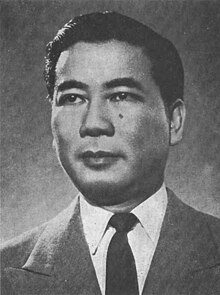Ngô Đình Diệm | |
|---|---|
 Official portrait, 1956 | |
| 1st President of South Vietnam | |
| In office 26 October 1955 – 2 November 1963 | |
| Vice President | Nguyễn Ngọc Thơ |
| Preceded by | Bảo Đại (as Chief of the State of Vietnam) |
| Succeeded by | Dương Văn Minh (as Chairman of the Military Revolutionary Council) |
| Minister of National Defense of South Vietnam | |
| In office 26 October 1955 – 2 November 1963 | |
| President | Himself |
| Preceded by | Position established |
| Succeeded by | Trần Văn Đôn |
| Minister of National Defense of the State of Vietnam | |
| In office 6 July 1954 – 26 October 1955 | |
| Prime Minister | Himself |
| Preceded by | Phan Huy Quát |
| Succeeded by | Position abolished |
| 6th Prime Minister of the State of Vietnam | |
| In office 16 June 1954 – 26 October 1955 | |
| Deputy |
|
| Head of State | Bảo Đại |
| Preceded by | Prince Bửu Lộc |
| Succeeded by | Position abolished |
| Minister of Personnel of the Nguyễn dynasty | |
| In office 8 April 1933 – 18 July 1933 | |
| Monarch | Bảo Đại |
| Preceded by | Nguyễn Hữu Bài |
| Succeeded by | Thái Văn Toản |
| Personal details | |
| Born | 3 January 1901 Đại Phong Lộc, Quảng Bình, Annam, French Indochina[1] |
| Died | 2 November 1963 (aged 62) Saigon, South Vietnam |
| Manner of death | Assassination by shooting |
| Resting place | Mạc Đĩnh Chi Cemetery (until 1983) Lái Thiêu Cemetery |
| Political party | Cần Lao |
| Other political affiliations | Dai Viet Renaissance Society [vi] |
| Relations | Ngô Đình Khôi (brother) Ngô Đình Thục (brother) Ngô Đình Nhu (brother) Ngô Đình Cẩn (brother) Ngô Đình Luyện (brother) |
| Parent | Ngô Đình Khả (father) |
| Education | Hue Pellerin Seminary National School College Hau Bo School, Hanoi Michigan State University |
| Signature | |
| Military service | |
| Allegiance | |
| Battles/wars | Vietnam War |
| ||
|---|---|---|
Prime Minister of the
State of Vietnam (1954–1955) President of South Vietnam (1955–1963)
Policies and theories
Major events
Elections
Diplomatic activities
Family
 |
||
Ngô Đình Diệm (/djɛm/ dyem,[2] /ˈjiːəm/ YEE-əm or /ziːm/ zeem; Vietnamese: [ŋō ɗìn jîəmˀ] ; 3 January 1901 – 2 November 1963) was a South Vietnamese politician who was the final prime minister of the State of Vietnam (1954–1955) and later the first president of South Vietnam (Republic of Vietnam) from 1955 until his capture and assassination during the CIA-backed 1963 South Vietnamese coup.
Diệm was born into a prominent Catholic family with his father, Ngô Đình Khả, being a high-ranking mandarin for Emperor Thành Thái during the French colonial era. Diệm was educated at French-speaking schools and considered following his brother Ngô Đình Thục into the priesthood, but eventually chose to pursue a career in the civil service. He progressed rapidly in the court of Emperor Bảo Đại, becoming governor of Bình Thuận Province in 1929 and interior minister in 1933. However, he resigned from the latter position after three months and publicly denounced the emperor as a tool of France. Diệm came to support Vietnamese nationalism, promoting both anti-communism, in opposition to Hồ Chí Minh, and decolonization, in opposition to Bảo Đại. He established the Cần Lao Party to support his political doctrine of Person Dignity Theory, which was heavily influenced by the teachings of Personalism, mainly from French philosopher Emmanuel Mounier, and Confucianism, which Diệm had greatly admired.
After several years in exile in Japan, the United States, and Europe, Diệm returned home in July 1954 and was appointed prime minister by Bảo Đại, against the French suggestion of Nguyen Ngoc Bich (a French-educated engineer, Francophile anticolonialist, a resistance hero in the First Indochina War, and medical doctor) as an alternative. The 1954 Geneva Conference took place soon after he took office, formally partitioning Vietnam along the 17th parallel. Diệm, with the aid of his younger brother Ngô Đình Nhu, soon consolidated power in South Vietnam. After the fraudulent 1955 State of Vietnam referendum, he proclaimed the creation of the Republic of Vietnam, with himself as president. His government was supported by other anti-communist countries, most notably the United States. Diệm pursued a series of nation-building projects, promoting industrial and rural development. From 1957 onward, as part of the Vietnam War, he faced a communist insurgency backed by North Vietnam, eventually formally organized under the banner of the Viet Cong. He was subject to several assassination and coup attempts, and in 1962 established the Strategic Hamlet Program as the cornerstone of his counterinsurgency effort.
In 1963, Diệm's favoritism towards Catholics and persecution of practitioners of Buddhism in Vietnam led to the Buddhist crisis. The event damaged relations with the United States and other previously sympathetic countries, and his organization lost favor with the leadership of the Army of the Republic of Vietnam. On 1 November 1963, the country's leading generals launched a coup d'état with assistance from the Central Intelligence Agency. Diệm and his brother, Nhu, initially escaped, but were recaptured the following day and assassinated on the orders of Dương Văn Minh, who succeeded him as president.
Diệm has been a controversial historical figure. Some historians have considered him a tool of the United States, while others portrayed him as an avatar of Vietnamese tradition. At the time of his assassination, he was widely considered to be a corrupt dictator.
- ^ "Đảo chính Ngô Đình Diệm". BBC News Tiếng Việt (in Vietnamese). 1 November 2013. Retrieved 30 November 2023.
- ^ British Pathé – "New York Hails Vietnam's President Diem (1957)"
